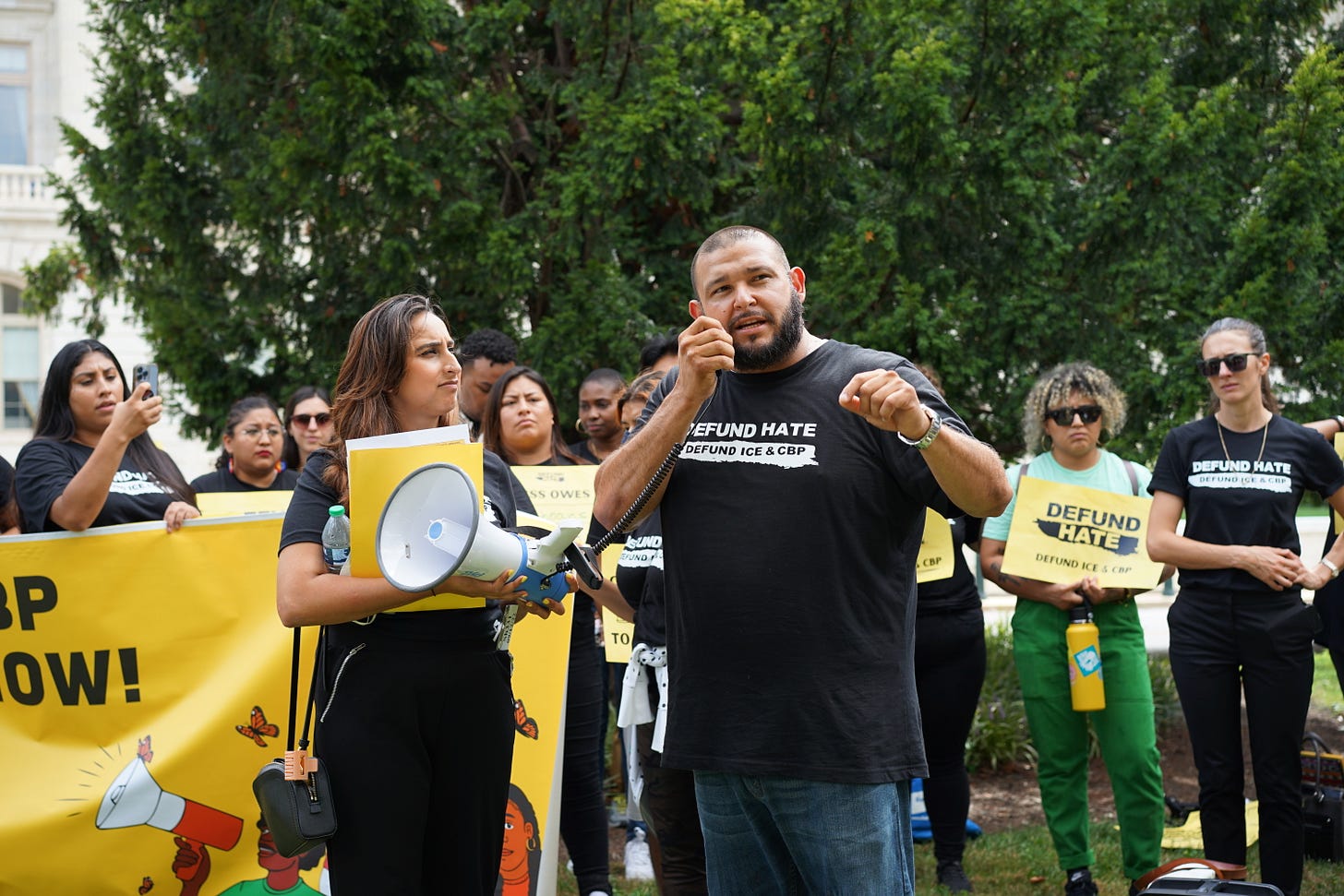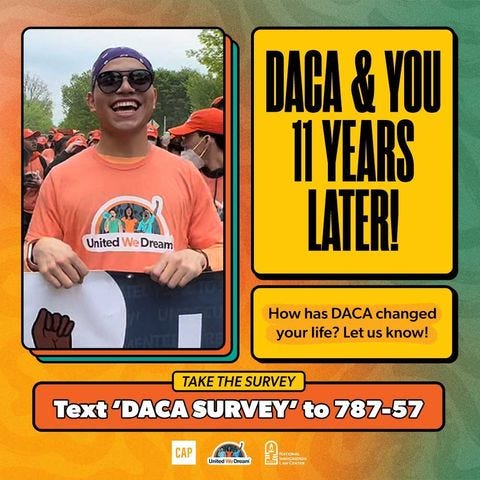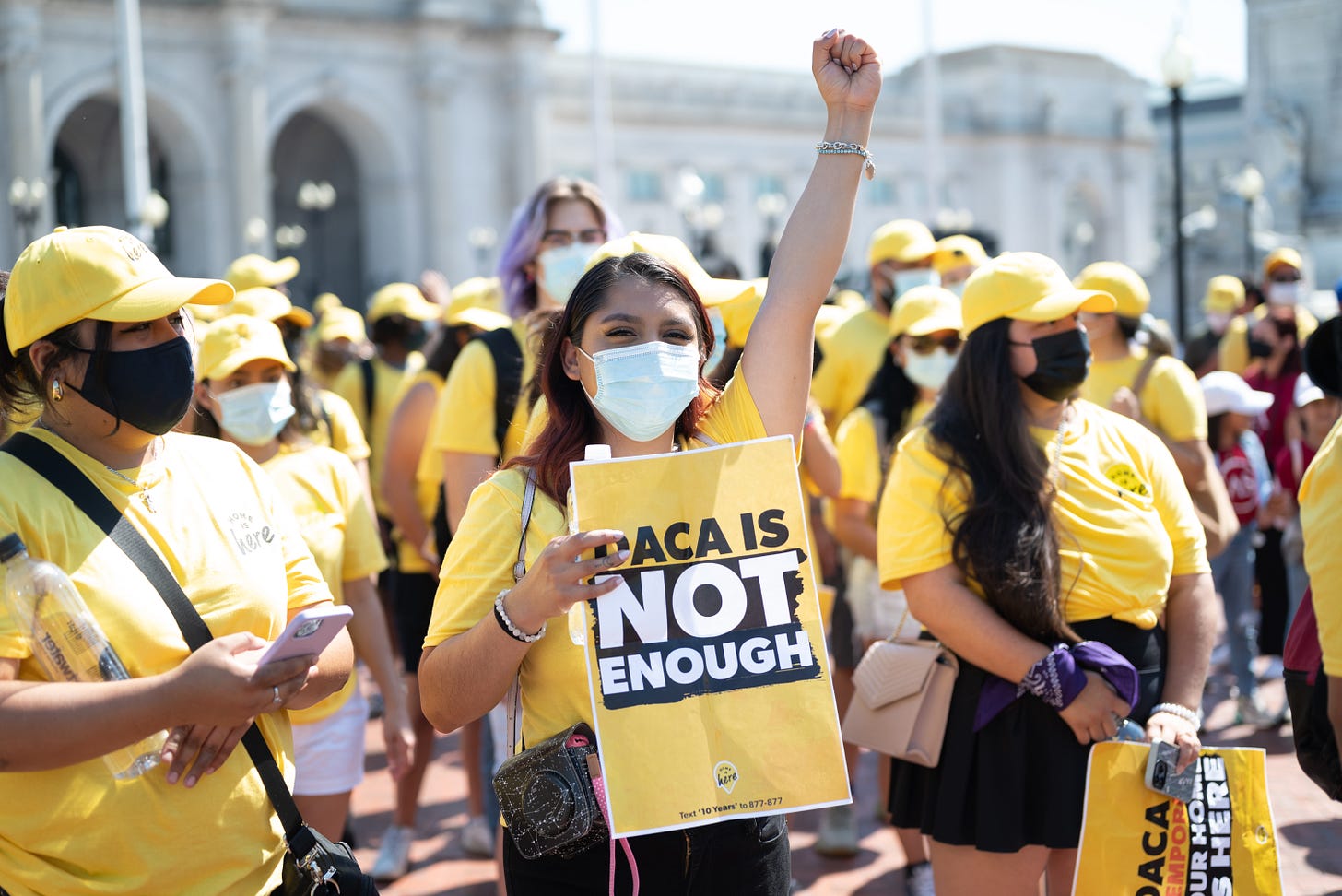“How do we create permanent solutions for our folks?”
Juanita Monsalve and United We Dream design pathways for change through joy and abundance.
Near the end of our conversation with Juanita Monsalve, the Creative Director for United We Dream, we asked her (like we ask most of our interviewees for La Cuenta) to reflect on the costs associated with living undocumented in the U.S. We are appreciative that Juanita centered joy and abundance in her response. Across the many projects Juanita is involved with at United We Dream, the loving focus on joy guides a vision for long-term social change.
If you missed the first two parts of our conversation with Juanita, take a look here and here.
ALIX DICK: You’ve shared so many powerful examples of the work that United We Dream has been doing. What's next for United We Dream? What's next?
JUANITA MONSALVE: Part of why this cultural change work is so important for us, is because it's an investment in the long-term transformation that we need to happen. At United We Dream, we like to think that we're taking a lot of different approaches to developing power for our people, and so there's the electoral work that we do. And so going into 2024, we're really thinking about, how are we engaging young people electorally?
“No Borders, Just Flavors” was a big investment into strengthening values of self-power, self-love, self-worth. We want to make a big investment into the narrative about abundance and collective care when we go into 2024, really infusing that into our electoral work as we continue to move forward and build that transformation.
There's definitely legislative work that we're continuing to push. Our expectation is that DACA will end up going to the Supreme Court. I was the digital lead of the Home is Here campaign when we went to the Supreme Court in 2019. It was a very different Supreme Court, and so the strategy was very different. So we're in this mode of developing what's the strategy for this new Supreme Court that we're facing. At the same time, we have to be able to push Biden and Congress, because DACA is temporary and DACA doesn't include a good chunk of our people. We want to be able to use these opportunities to expand and to fight for things that are even more permanent. When DACA was created, it's interesting, there was a big schism in the immigrant rights movement, because not everybody believed in DACA as a strategy and young people really wanted to push it forward. And so I think the continuation of DACA as a strategy has to do with Clean Dream Act and Dream and Promise Act. So how do we expand to create permanent solutions for our folks, and how do we expand the amount of folks who can have access to that?
There’s also work that we're doing at the local and state level. And then there's other strategies to diminish the budget of CBP and ICE that we're moving forward. There's a lot of different strategies that we're moving forward to be able to ultimately have the power to demand what our folks need. I think we're in this moment of power building and really being aware that white supremacy continues to learn from our movements and make gains in our communities. For us, it's really important to build a stronger movement across issues during this time.
There's a lot of different strategies that we're moving forward to be able to ultimately have the power to demand what our folks need.
ANTERO GARCIA: Sounds like you're just twiddling your thumbs and not being busy at all!
JM: It's nonstop.
AD: The DACA work is so difficult.
JM: I think it's been the biggest win in the immigrant’s rights movement in 40 years. At the same time, it doesn't touch nearly enough people directly. There's a lot that I think that we as leaders have learned from the fight for DACA. In some ways this moment for DACA is really about expansion.
AG: Our name, La Cuenta, comes from this idea: what if we could charge the United States for what it actually takes from someone who's undocumented in this country, the financial and social and physical tolls that are paid by every day. In your own explorations and the projects you've led, if you could hand such a bill to the government based on what surviving the United States is like as an immigrant?
JM: I've never thought of it that way. I think at the core of the anti-immigrant sentiment is this need to continue to profit. For example, the reason why so many Black people are taken into jail is the continuing profit from Black and Brown lives and Black and Brown work. It sounds really nice to have lots of undocumented labor and never have to provide them healthcare. I think it's a great concept to think about as well, but what would I serve as La Cuenta? Man, it's so big. But I think ultimately, I guess I just come from this really big sense of restorative justice.
And so for me, what would be enough would be affording people who are undocumented all of the rights that are stolen from them, that belong to them just for being human, that they're deserving of just for being human: access to healthcare, access to housing, access to economic stability, access to being able to invest in the way in which people who have papers are able to invest. I'm not so worried with what happened in the past. I'm more worried about what the future looks like, and how do we afford those folks everything that they need in order to continue to live their lives?
I genuinely think that most folks who I know who have experienced being undocumented, their day-to-day is not sad. They're very happy people. Our people always find joy. They're having the barbecue. There's these neighbors here that every time I pass, they have a whole giant pig being roasted. And I'm always like, how can I meet that family?
[laughs]
AD: That's the family to know!
JM: Yeah, definitely. And so it's like, for me, I think that our people don't sit around angry or resentful. They're so ready to move forward, and they're ready to fight for what they deserve and what they need. At the end of the day, I'm fighting for how we can have the things that are truly the basic decency of being human and our dignity being respected.
AG: Thank you.
JM: Yeah. But La Cuenta is a difficult concept because there's a part that it's like, “Do we go to toe to toe?” And it's almost like similar to so many Black leaders and theorists who the conversation on reparations is still continuing, and so it's complicated one, but I love the concept of La Cuenta, that's cool.
AD: I'm really grateful that we have so much resilience in our hearts and so much happiness and joy that we share. How can people support the work of United We Dream?
JM: We need to bring as many people as we can into the fold. Go to our website. You can sign up just to receive invitations, join events, show up. Where I come from in terms of my organizing theory is that not everybody's going to show up in the same way. Not everybody's going to donate. Not everybody feels comfortable going to an action, but there's so many events that you can join. There's even wellness events through our UndocuHealth program.
There's so much that you can do, even just retweeting, following on social media, showing up on TikTok, and stitching your TikTok. Watching “No Borders, Just Flavors” and letting people know about it is a super important thing, because I think those are transformative moments that have impact for the long run.
Propina
We want to thank Juanita and everyone at United We Dream for the work that they continue to do and for sharing the grounding principles behind it.
If you are not following United We Dream, there are many ways to do so! And if you haven’t watched No Borders, Just Flavors, we highly recommend it:
We’ll see you next week!







